Barely illegal: A tour of LA’s highbrow cannabis scene
Sensuality circles! High teas! Expensive vape pens! Who says there’s no intellectual life among Los Angeles’s pot smokers?
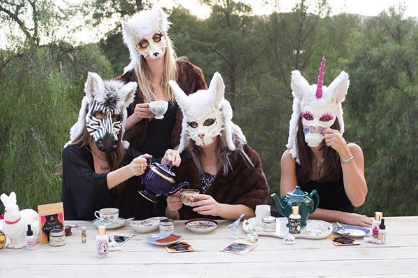
Carli Jo Bidlingmaier talks to a group of twentysomethings in a living room in the Bel-Air neighbourhood of Los Angeles, weeks before the recent wildfires. She is explaining that consuming marijuana allows a woman to awaken her “yoni”, a Sanskrit term for vagina favoured by Hollywood bohemians.
“Everybody stand up!” she shouts. The crowd, all women, seated on pillows on the floor, leap to their feet.
Bidlingmaier, a former casting producer for reality show The Bachelor, vigorously shakes her hips. She is leading the women in a “cannabis sensuality circle” that seems like something out of a 1960s hippy commune: joints, frank talk about sexuality, meditation and – at the end of the night – a headlong plunge into a big bowl of strawberries and dark chocolate.
“It is our divine right to enjoy our pleasure,” Bidlingmaier says. No one disagrees.
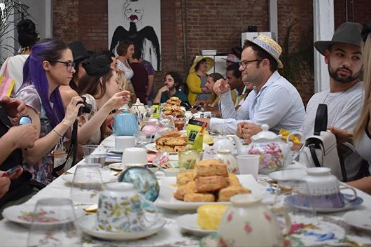
In January, California will join the list of states where recreational marijuana is legal, along with Oregon, Washington, Colorado and Alaska. With researchers tallying California’s marijuana sales at $7.7bn (£5.74bn) last year, the so-called green rush has already turned gold. Next year, The Standard hotel in Hollywood plans to open a dispensary for edibles. “It’s exploding in a good way,” says Emerald Castro, a brand ambassador for cannabis startups. “There are a lot of professionals on board.”
Cannabis sales, currently for medicinal purposes, are primarily a cash business. (Federal laws prohibit the use of banks for illegal drugs.) And with restrictions on advertising, the industry retains something of a quaint dorm-room vibe.
That means parties. Lots of them. Parties to educate and inform new users. Parties to connect to friends who partake. And parties to sell, sell, sell cannabis to an unfamiliar public, most of whom still think “Girl Scout Cookies” are for eating, “Moby Dick” is a novel, and “Skywalker” is Luke’s last name, rather than chic new strains.
Along with the sensuality circles, there are get-togethers for gamers who smoke pot, marijuana Christmas parties, classes where artists can puff and paint. There are studios where yogis smoke sensimilla with their shavasana and members-only co-working spaces where entrepreneurs can enjoy a dab of hash while poring over data-flow diagrams and accounting receipts.
“It all comes down to not feeling like a criminal, being seen as a criminal,” says Douglas Dracup, 31, whose Hitman Coffee Shop on south La Brea Avenue is one of these spaces. Parties, he said, have “set the stage for the industry to flourish”.
Below, a recent tour of Los Angeles’s flourishing pot scene.
A different kind of high tea
In a gated office building off Sunset Boulevard, tucked between a parking lot and two motels, about 25 people gather one recent Saturday for “White Rabbit High Tea”. Jessica Cole Eriksen, 34, began hosting tea parties in April 2016 after working as a nanny in Ireland where a brew was a daily ritual. “I’m rolling joints so, everyone, let’s get rolling,” says Eriksen, who brought a box filled with masks and hats for people to wear. “I’m so happy you are here on this lovely afternoon.”
Some were friends or guests who read about the tea party, which costs $65, online. “I saw it on Instagram last month, and I thought I would come,” says Bridgett Davis, in between puffs under her leopard-print hat. “In December, I’m going to pull out my mink. It’s a different kind of crowd, not teenagers or millennials.”
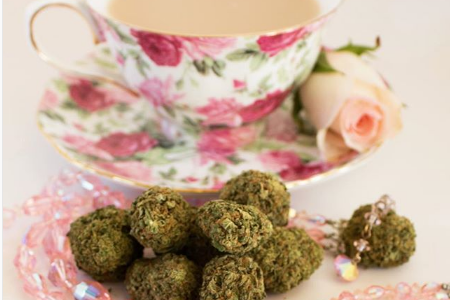
Holden Jagger, a former executive pastry chef at the Soho House who started a cannabis cooking and cultivation business last year, prepares the meal. The table is set with place cards, gold-lace paper napkins and strategically arranged ashtrays. There’s no pot in the roasted corn and buttermilk scones. But there are plenty of joints, vape pens and edibles on the table. A server wearing a crimson dress and rabbit ears pours peach green tea.
Tara Dawn Roseman, an eyebrow aesthetician, examines a bottle of lotion infused with medical marijuana.
“My dad loves this stuff,” said Roxanne Dennant, whose company, Fruit Slabs, makes cannabis-infused fruit leather. “He rubs it on his hands.”
“My hands are always hurting,” Roseman says.
“Then use some!” replies Dennant. “They are on the table to be used.”
There are a lot of products to try: cannabis-infused cellulite cream, lip balm and chocolate cookies, and small bottles of artisanal buds from Northern California. Roseman brought some pot from home, which she dumps on a plate so she can roll a joint. Platters of finger sandwiches are passed round.
“Do you find yourself with friends that want to talk about something else?” says Dennant. “We can’t. We are passionate.”
Eriksen refrains from smoking because she’s pregnant. She watches as guests eye the buds on the table. “You get a gift bag so you don’t need to pocket anything,” she says.
As caramel popcorn and apple pie cookies are passed, the table grows silent. A man puts a zebra mask over his face and scrolls through his cellphone. “I was just staring off into the sky and thinking, ‘I am sufficiently stoned,’” Dennant says.
Davis says: “You feel like not talking so much anymore.”
Jagger joins the table. “I had a mom give me a cookie once,” he says, recalling his early twenties. “I just couldn’t talk for a while. My arms were moving, but my mouth wasn’t working. She put a whole plant into butter and it was pretty strong.”
When he was a younger man, Jagger says, he prided himself in baking potent cookies. Nowadays, cooks are better at tempering the high. “The idea that we can manage it,” he says, “takes the fun out of it.”
Taking care of the stars
Maya Cooper is dressed in raspberry tights, gold chains and a blue kufi, a tableau that looks vaguely like vintage MC Hammer. It’s the day before Halloween and Snoop Dogg is hosting his wife’s birthday party; a 1980s-themed bash in an industrial building near the airport. “It’s my job to know everybody,” says Cooper, holding court in a hazy, smoke-filled lounge packed with couches and a bar crowded with jars of marijuana buds, rolling papers and smoking accessories.
Cooper, 31, is the associate director of marketing for Merry Jane, a digital media company started in 2015 by Snoop Dogg to promote marijuana culture. She is better known, though, as a “budtender” to the stars. An Ohio native who once worked for Rolling Stone, she says she taught Gwyneth Paltrow how to use a vape pen. She has hosted bud bars at parties for music producers Diplo and Calvin Harris. Cooper has even spun cannabis-infused sugar into cotton candy for Miley Cyrus at a birthday party for Cyrus’ boyfriend, Liam Hemsworth.
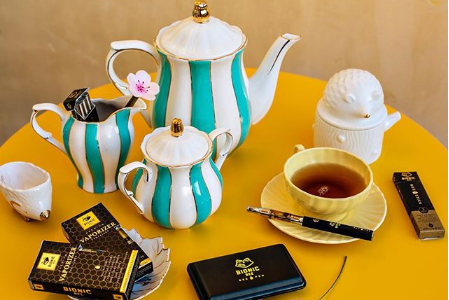
These days marijuana is marketed like coffee beans. Humboldt’s Finest, a collective from Northern California, is tonight’s sponsor. Among the strains scrawled on a menu are Sunset Sherbet (“luscious melty treat”), Cookies (“an uplifting, potent high”) and OG Kush (“for total body melt”). A guest sidles up to the bar and asks for six joints and some buds for a bong. On the dance floor, where Snoop Dogg is twirling with his wife, trays of pre-rolled joints are passed by female servers.
Last January, Cooper teamed up with a dispensary to host a bar at a 30th birthday party for Cade Hudson, a talent agent who works for Creative Artists Agency. The party was held on the roof of an apartment complex in Beverly Hills and about 200 people showed up. Singer Nick Jonas asked for a joint, Cooper says. Others kept their distance. “Sometimes celebrities will pass by”, she says. “They aren’t interested in coming to the station. So we bring the gift bag to them.”
Cooper says sponsors don’t get paid to give away product, which makes a bar a costly proposition. The average price of a joint is about $3.50; small batch or craft cannabis costs twice that. “It’s hard to regulate celebrities,” she says. “They are used to having whatever they want.” The music crowd is notoriously grabby. So much so, she toyed with the idea of making people who give parties pay. Cooper says they ran out of pre-rolled joints halfway through the night at a Def Jam event during Grammy week.
“People kept coming back to the bar,” she says. “They try to pretend like they are someone else. They kept stuffing their pockets. Someone even came over to the table, but this time with his hat off. I said, ‘I still recognise you.’”
A bake sale, so to speak
When Jessica Assaf talks about marijuana, she always uses the pronoun “she”. “It is the female plant that creates this precious flower,” she says one evening at a party in Venice. The booming cannabis market is filled with female entrepreneurs. “We are a community,” says Assaf, a former beauty and marketing executive. “And we show up for each other.”
Indeed. About 100 people are crowded a fenced-in yard at the home of Abby Gould, an acquaintance of Assaf’s who works for a firm that invests in the cannabis industry. Lit candles are placed on wooden railings. A singer playing acoustic guitar serenades guests gathered on the front lawn under a string of lights. No one is sipping chardonnay. The crowd was there for a “bake sale” sponsored by Cannabis Feminist, the company Assaf founded a year ago to sell marijuana wellness products at home.
It’s like a Tupperware party for the smoke set. Guests bought tickets for $5, which are exchanged for edibles, creams or smoke. (Gifts of cannabis are allowed, Assaf says; direct sales are not.) There are oils by Foria to enhance sexual pleasure, a powder from Mondo that could be sprinkled in food to soothe an anxious mind and Hmbldt vape pens to calm, sleep or arouse. One woman bought $105 worth of pink tickets for cannabis-infused capsules with turmeric to reduce chronic inflammation.
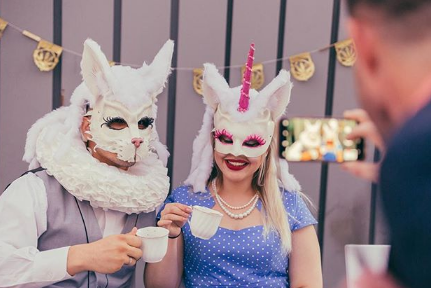
Assaf is adept at creating community among her peers, organising weekly get-togethers. “It is an important part of reaching the audience,” says Derek McCarty, chief marketing officer for Hmbldt. “People turn to their best friends for advice.” Cannabis Feminist teamed with Snoop Dogg’s Merry Jane to create a series, Queens of the Stoned Age, a chat show with Assaf and guests who explore their relationship with cannabis. They hired an all-female crew, and Assaf committed to including more ethnically diverse smokers in coming episodes.
Despite the transactional nature of the bake sale, there was still, as one might imagine, a relaxed vibe.
Hannah Mason, a founder of Lit Yoga, sets up a low-slung table and pillows under a tree. She has nothing to sell; she is there to support her female mates. Mason serves green tea and passes joints to passersby who join her, something she and her students share before every yoga class. One student, Ryan Der, a maker of custom iron doors, is there. “It’s cool to connect with humans,” he says, packing a rolling paper. “Most of the time everyone is on their phones.”
© New York Times
Join our commenting forum
Join thought-provoking conversations, follow other Independent readers and see their replies
Comments
Bookmark popover
Removed from bookmarks